How to maintain a balanced and fulfilling lifestyle after addiction

Laying the Foundation for a Fulfilling Post-Recovery Life
Recovery from addiction marks the start of a transformative journey toward health, happiness, and stability. Achieving a balanced and fulfilling lifestyle requires intentional effort, supportive resources, and ongoing personal growth. This article explores practical strategies for maintaining sobriety, establishing wellness routines, nurturing emotional health, rebuilding relationships, and engaging with recovery communities to foster long-term success.
Establishing a Holistic Daily Routine for Sustainability
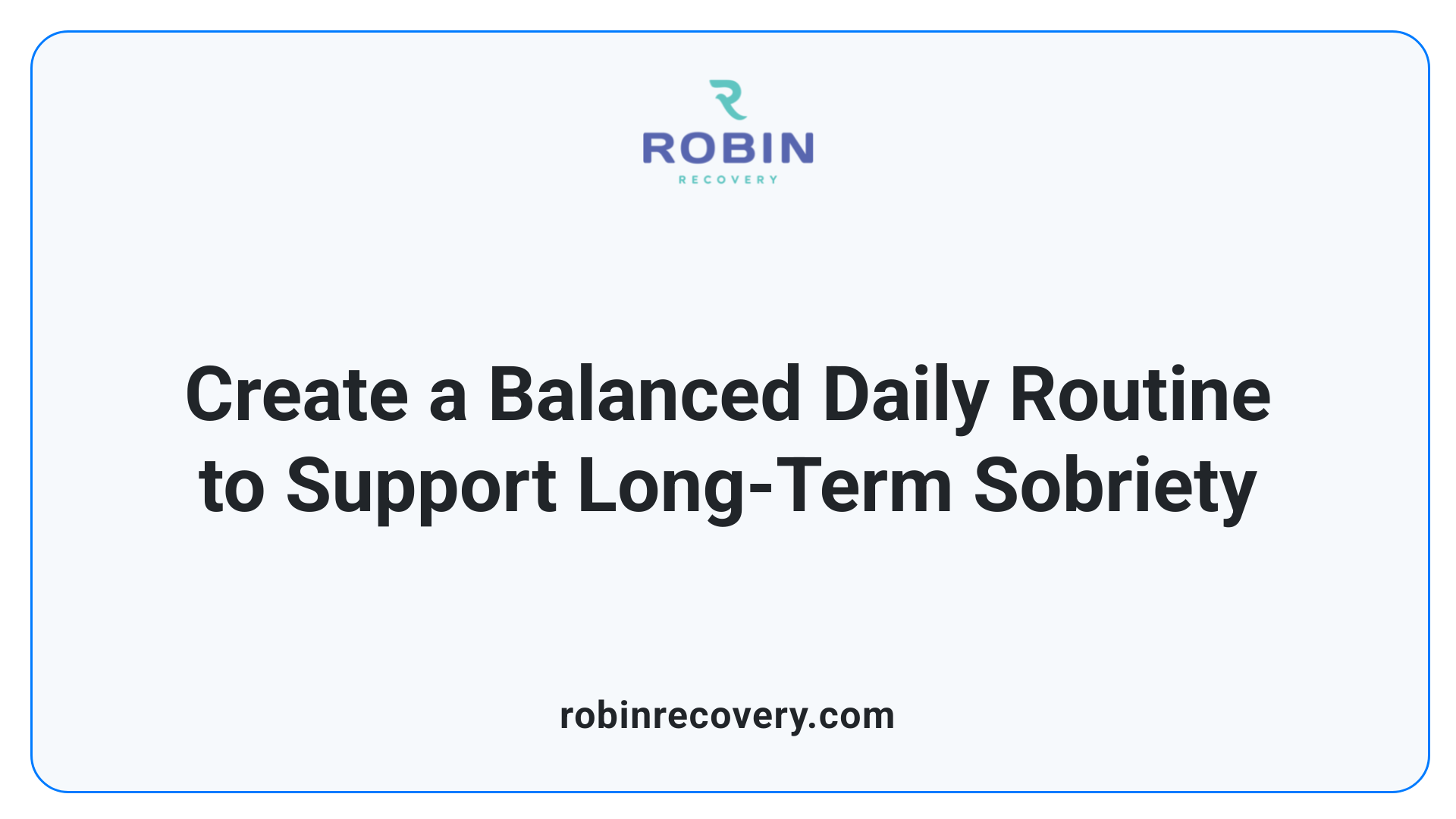
How to create a balanced daily routine that supports health and reduces relapse risk?
Designing a daily schedule that nurtures both the body and mind is crucial for long-term sobriety. A well-rounded routine begins with establishing consistent sleep habits, aiming for seven to eight hours of quality rest each night. This helps restore brain function and emotional balance.
Nutritional intake also plays a vital role. Eating a balanced diet rich in fruits, vegetables, lean proteins, and whole grains not only repairs bodily damage caused by addiction but also supports mental clarity and overall health. Incorporating regular physical activity, such as walking, yoga, or swimming, releases endorphins that naturally boost mood and reduce stress.
Mindfulness practices like meditation, deep breathing, and grounding exercises foster emotional resilience by helping manage cravings and negative emotions. These techniques create a calm foundation to handle life's challenges without relapse.
Building a social support network—including participation in recovery groups, alongside supportive friends and family—provides accountability, encouragement, and a sense of belonging. These relationships reinforce positive behaviors and offer vital emotional backing.
Engaging in hobbies or volunteer activities adds purpose and helps create a fulfilling daily rhythm. Pursuits like art, gardening, or community service can serve as positive outlets that replace substance-related triggers.
Preventing relapse also involves avoiding high-risk situations and environments associated with past substance use. Developing communication and coping skills allows individuals to navigate social pressures effectively.
Finally, embracing a mindset of continuous growth by setting small, achievable goals maintains motivation and reinforces a sense of accomplishment. Regularly reviewing and adjusting routines with flexibility ensures they remain effective and sustainable.
Foundations of a Fulfilling Lifestyle Post-Recovery
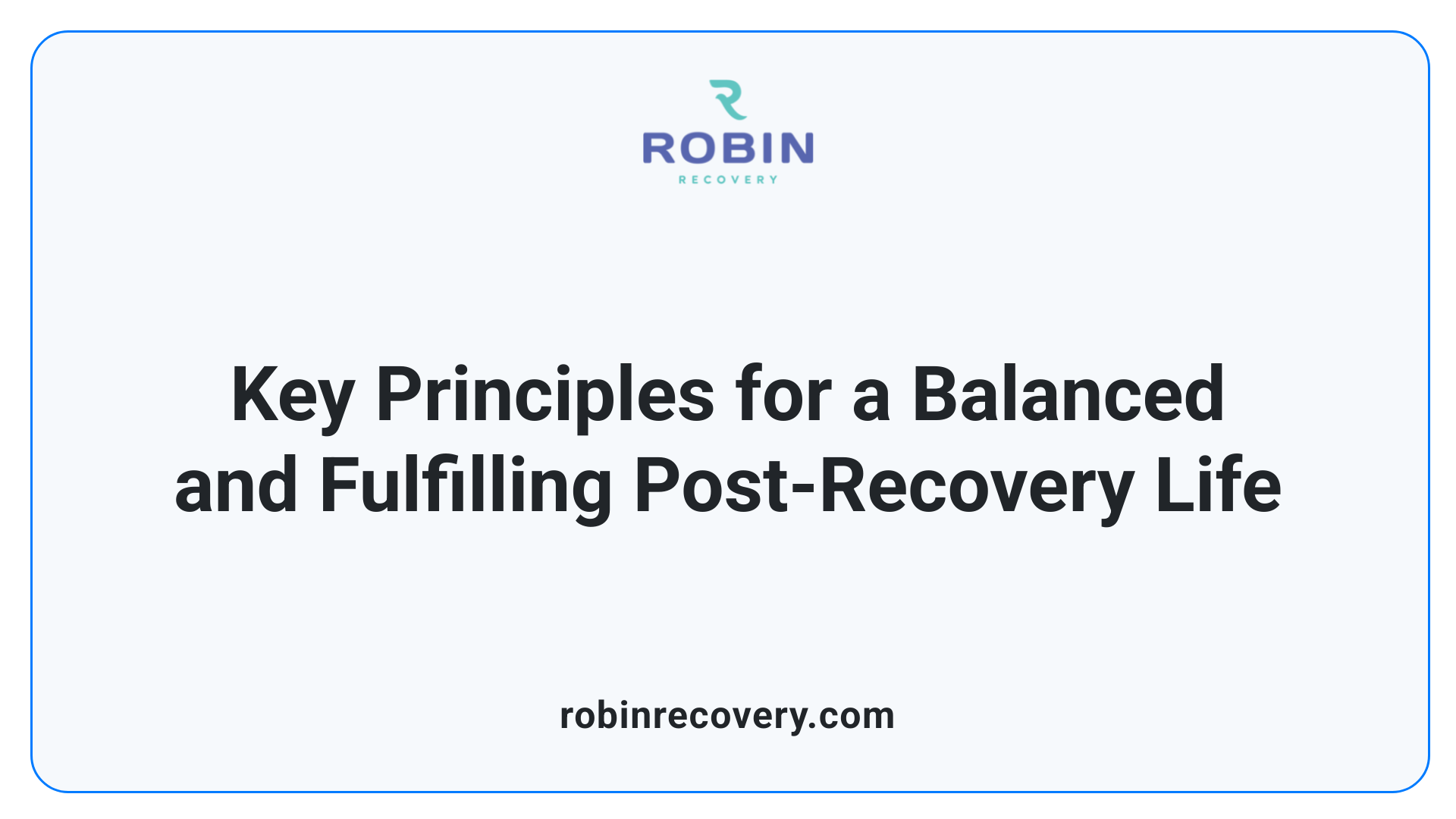
What are key principles for building a balanced and fulfilling lifestyle after addiction recovery?
Building a stable and satisfying life after overcoming addiction centers around several fundamental principles. Establishing a routine is crucial; this means creating consistent wake-up times, meal schedules, work or activity hours, and designated relaxation periods. Maintaining proper nutrition with a balanced diet rich in fruits, vegetables, whole grains, lean proteins, and healthy fats supports physical healing and mental clarity.
Regular exercise is another pillar, promoting physical health, reducing stress, and producing mood-enhancing endorphins. Activities like walking, yoga, or team sports can be highly beneficial. Equally important is ensuring adequate sleep—aiming for seven to eight hours per night with a regular bedtime helps stabilize mood and improves overall resilience.
Finding and pursuing purpose provides direction and motivation. This can be through engagement in work, volunteer activities, spiritual practices, or hobbies suited to one’s interests and values. Such pursuits reinforce self-esteem and bring joy, effectively replacing former substance-related sources of pleasure.
Building a strong support network is vital. Relationships with family, friends, support groups such as AA or NA, and mental health professionals offer encouragement, accountability, and a sense of belonging. These connections serve as safety nets during challenging times.
In addition, stress management techniques such as mindfulness meditation, deep breathing exercises, and yoga help manage life's pressures without relying on substances. Addressing mental health issues through professional counseling ensures underlying emotional or psychological factors do not trigger relapse.
Lastly, engaging consistently in hobbies or community service fosters a sense of achievement and community belonging. Whether it’s artistic pursuits, gardening, or volunteering, these activities boost emotional well-being and help maintain long-term sobriety.
Together, these principles form a comprehensive foundation that supports a balanced, resilient, and meaningful post-recovery life. Prioritizing such holistic well-being ensures lasting sobriety and personal fulfillment.
Building Healthy Habits and Fostering Personal Fulfillment
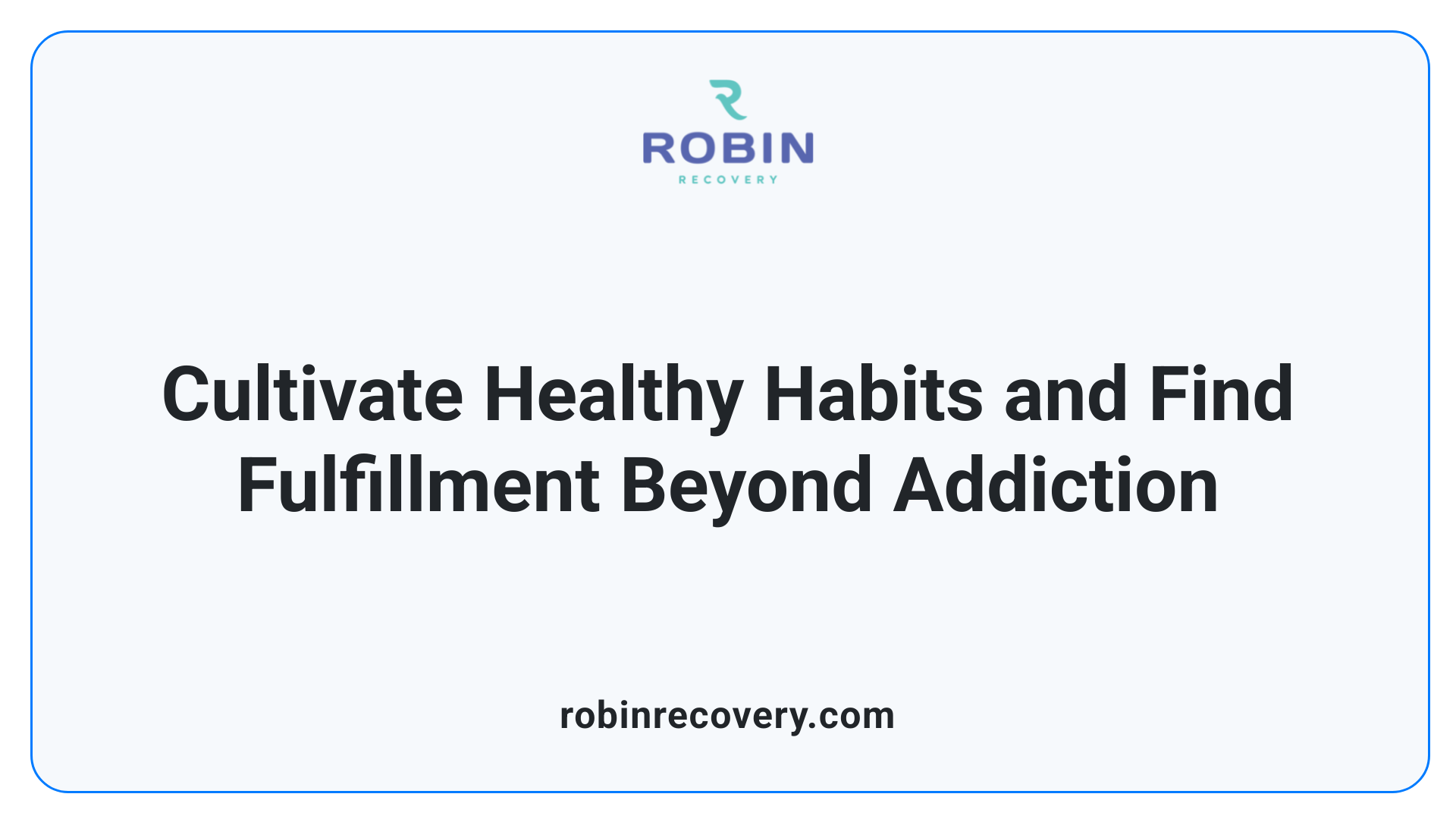
What are some tips for establishing wellness routines, healthy habits, and hobbies post-recovery?
Creating a balanced lifestyle after overcoming addiction is essential for maintaining sobriety and enhancing overall well-being. One of the first steps involves establishing a wellness routine that incorporates physical, emotional, and mental health practices.
A good starting point is developing a daily schedule that includes regular physical activity. Activities like walking, yoga, or participating in sports promote physical health, reduce stress, and release mood-boosting endorphins. Complementing exercise with nutritious meals rich in fruits, vegetables, lean proteins, and whole grains helps repair the body's damage caused by substance use and supports brain health.
Sleep hygiene is another cornerstone of a healthy routine. Ensuring seven to eight hours of quality sleep each night, maintaining a consistent sleep schedule, and avoiding caffeine late in the day can significantly improve mental clarity and emotional resilience.
Mindfulness and meditation provide mental calmness, stress reduction, and better emotional regulation. Even short daily sessions, such as deep breathing exercises or grounding techniques, can make a considerable difference.
Alongside routines, engaging in hobbies and activities that bring joy and fulfillment is vital. Volunteering, artistic pursuits like painting or music, gardening, or participating in community groups offer purpose and help replace old substance-related habits.
To reinforce these habits, many individuals find it helpful to use tools like journals, smartphone apps, or support groups. Journaling can facilitate reflection, track progress, and foster gratitude, while apps can provide reminders and encouragement. Support groups not only offer accountability but also connect individuals with others who understand their journey.
Setting achievable, measurable goals and being flexible in routines ensure sustained efforts. Celebrating small successes builds confidence and motivation. Remember, building new habits requires patience, self-compassion, and a willingness to adjust strategies as needed.
In summary, consistency in routines, engaging in positive hobbies, utilizing support tools, and maintaining a compassionate approach are all fundamental for establishing a healthy, fulfilling post-recovery lifestyle. These practices help create a resilient foundation, making sobriety sustainable and enriching life beyond addiction.
Strategies for Sustained Sobriety and Emotional Well-being
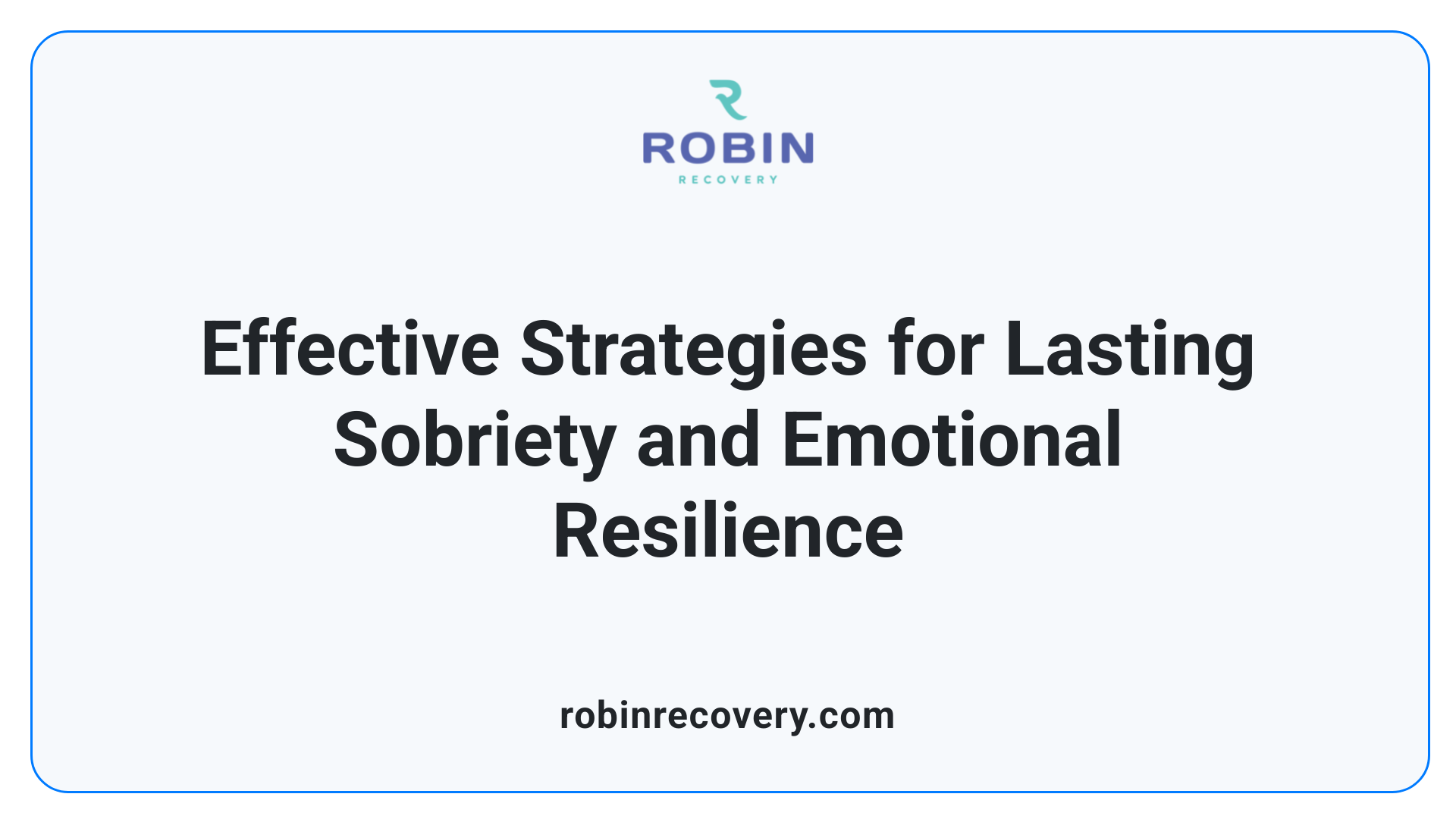
What are effective strategies for maintaining sobriety and well-being after addiction treatment?
Sustaining sobriety after completing addiction treatment involves employing a multifaceted approach to health and wellness. Engaging in daily routines that promote physical and emotional stability helps create a consistent foundation for recovery. Incorporating activities like regular exercise, nutritious meal planning, and adequate sleep supports bodily healing and mental clarity.
Building a robust support system is crucial. Connecting with family, friends, therapists, and participation in recovery groups such as Alcoholics Anonymous (AA) or Narcotics Anonymous (NA) provides emotional backing and accountability. Utilizing professional resources, including the SAMHSA helpline, can connect individuals to local treatment facilities, outpatient services, therapy options, and peer support networks. This ongoing engagement helps maintain motivation and addresses underlying issues that could trigger relapse.
Addressing emotional triggers and stressors with mindfulness practices, such as meditation, deep breathing, and grounding techniques, equips individuals to manage cravings and emotional setbacks effectively. Developing a personalized relapse prevention plan, which may involve avoiding high-risk environments, recognizing early warning signs, and implementing coping strategies, fortifies long-term sobriety.
A balanced lifestyle encompasses not only avoiding substance use but also nurturing personal interests and hobbies. Volunteering, pursuing new passions, and social activities foster a sense of purpose and fulfillment. Regular self-care routines—such as practicing gratitude, journaling, and engaging in creative arts—help reinforce positive mental health.
Maintaining engagement with ongoing therapy and education is also vital. Professional counseling, whether individual, group, or family-based, helps address unresolved psychological issues, process emotional challenges, and develop healthier coping mechanisms. Education about addiction and self-care increases awareness and confidence in managing life stresses without resorting to substances.
Naturally, each person’s journey is unique. Success in long-term sobriety relies on continuous effort, flexibility, and the willingness to seek support when challenges arise. Celebrating small milestones, embracing setbacks as opportunities for growth, and remaining committed to personal health are fundamental strategies for lasting recovery.
Rebuilding Life and Relationships in Recovery
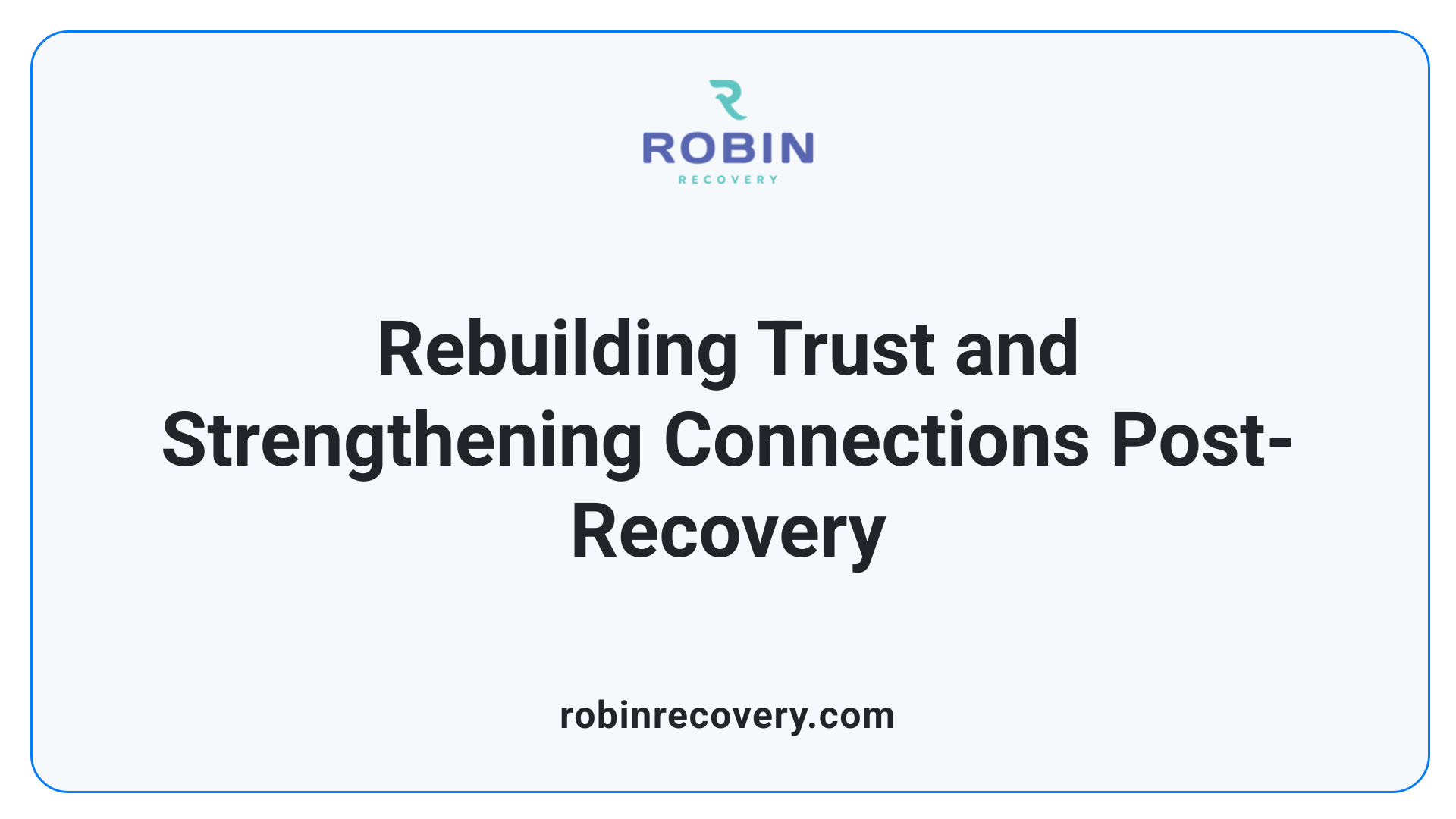
How can I seek support through professional services and community resources?
Supporting oneself through professional services and community resources is vital in the journey of recovery. The Substance Abuse and Mental Health Services Administration (SAMHSA)’s National Helpline offers free, confidential help 24/7, connecting individuals with local treatment facilities, support groups, and community organizations. This helpline can be accessed via phone at 1-800-662-HELP (4357), online treatment locators, or through the HELP4U text service.
Utilizing these services does not mean you are alone in your recovery. Many people find that engaging in ongoing therapy or programs like those provided by Recovery Centers of America—offering detox, residential and outpatient care, and alumni support—strengthens their path to sobriety. These professional supports help address underlying emotional issues, develop coping strategies, and establish healthy routines.
Joining community-based support groups such as Alcoholics Anonymous (AA), Narcotics Anonymous (NA), or SMART Recovery, offers additional benefits. These groups provide a sense of community, accountability, and shared experiences that reinforce commitment to sobriety. Together, therapy, support groups, and community networks form a comprehensive safety net, essential for long-term recovery.
How do I restore trust and communicate effectively with loved ones?
Restoring trust and improving communication are often pivotal challenges after addiction. It requires patience, honesty, and consistent effort. Open and transparent conversations help rebuild damaged relationships. Sharing feelings, fears, and progress with loved ones can foster understanding and empathy.
Forgiveness plays a crucial role—both forgiving oneself and encouraging loved ones to forgive past mistakes. Setting boundaries and demonstrating responsible behavior over time helps rebuild trust. Family therapy sessions can facilitate healthier dialogue and understanding, creating a supportive environment for recovery.
Being reliable, following through on commitments, and showing genuine remorse and appreciation reinforce trust. Remember, rebuilding relationships doesn’t happen overnight; persistence and open hearted communication are vital.
How can I prioritize self-care, set goals, and manage expectations?
Prioritizing self-care is foundational to recovery. Incorporate routines that promote physical and emotional wellness, such as balanced nutrition, regular exercise, adequate sleep, and mindfulness practices like meditation or yoga. These habits improve resilience against triggers and support mental clarity.
Setting realistic, achievable goals keeps momentum steady. These might include daily steps like attending support group meetings, completing therapy sessions, or adopting a new hobby. Break larger aims—such as rebuilding a relationship or returning to work—into smaller, manageable tasks.
Managing expectations is equally important. Understand that recovery is a gradual process with setbacks as part of growth. Practice self-compassion and celebrate small victories. Building a strong support network of family, friends, therapists, and community groups provides encouragement and accountability.
By maintaining a focus on self-care, goal-setting, and realistic expectations, individuals will find greater stability, purpose, and motivation to sustain a sober lifestyle. This holistic approach fosters personal growth and helps turn recovery into a lifelong positive journey.
Embracing the Journey of Long-Term Recovery
Maintaining a balanced and fulfilling lifestyle after addiction is an ongoing journey that involves nurturing body, mind, and relationships. Utilizing community resources, establishing healthy routines, addressing emotional needs, and engaging in purposeful activities foster resilience and long-term sobriety. Remember, progress may be gradual, and setbacks are part of growth—approaching recovery with patience, compassion, and support ensures a sustainable path forward. By embracing these principles, individuals can rebuild a meaningful life free from substance dependence and full of personal achievements and well-being.
References
- National Helpline for Mental Health, Drug, Alcohol Issues - SAMHSA
- Life After Treatment: Creating a Fulfilling and Sober Lifestyle ...
- Crafting a Balanced Life Beyond Addiction Recovery
- Rebuilding Your Life and Finding Purpose After Addiction | RCA
- How to Maintain Healthy Habits in Addiction Recovery
- Self-Care Importance in Addiction Recovery for Well-Being | RAC
- Nutrition Guide For Addiction Recovery - Gateway Foundation
- Discover 3 Secrets to a Fulfilling Sober Lifestyle - Wish Recovery
- Practical Tips to Maintain Sobriety after Treatment - Mississippi Drug ...
